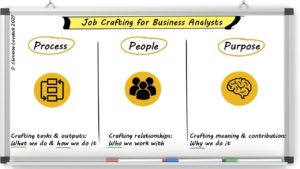
Job Crafting for BAs
You don’t have to change roles or organizations to get more enjoyment and satisfaction from your work. There are many ways to make your current job work better for you.
Job Descriptions
The description of the BA role looks fairly similar from one organization to the next. Some ask for a bit of specialization, some are more technical, some are more strategic. Sometimes there are formal management responsibilities, sometimes informal support and mentoring. And yes, some organizations put in strange requirements and duties which make us wonder if they know what business analysis is… but, for the most part, it’s pretty standard. And yet, we all know that the practice of business analysis can be very different between organizations and roles. It is tempting to believe that it is purely the organization and culture which is causing these differences; in reality, the individual BAs often influence the role a great deal.
Job Crafting
Most organizations have many formal and informal ways that employees change or ‘craft’ their role. Including things like becoming a:
- First aider
- Mentor
- Social organizer
- Staff representative
- Fire warden.
Most of the time people are either asked to volunteer for these roles or assume them by default, but these ‘optional extras’ often give them a feeling of purpose and wider contribution.
This is the essence of job crafting – looking for opportunities to gain or utilize skills in a way that gives pleasure or purpose. Maximizing the things you are good at and enjoy, minimizing those you don’t. The beauty of job crafting is that people enjoy and are good at different things, so no one is being disadvantaged by not carrying out their whole job description, or adding a few extra things in! And – allowing people to work in this way increases engagement, wellbeing, and productivity.
Advertisement
Crafting Business Analysis
BAs often have a lot of autonomy; to apply the techniques we think are appropriate, to engage with different people, to create the outputs we believe will be suit the situation, and critically how we chose to frame the work we do.

Crafting the Process
The right business analysis approach differs from one assignment/project/product to the next. If we want to inject more creativity, we can do that. If we want more structure, we can do that too. We don’t have to stick in the narrow lane of business analysis consisting of only workshops and user stories. We can create outputs and diagrams which demonstrate the bigger picture, show how everything fits together, and offer value by creating a shared understanding. If you are interested in:
- Creativity – use more visual methods
- Variety – learn a new analysis technique and look for opportunities to use it
- Re-use – create and promote templates
- Challenge – ask for new opportunities and responsibilities
Crafting Relationships
Good relationships are what make good workplaces. BAs often know lots of people from many different departments and roles, as well as BAs in other organizations. It is possible to build meaningful working relationships, with people who bring out the best in us and motivate us. We can use different engagement methods, such as regular check-ins, newsletters, and surveys to build both engagement and relationships. If you are interested in:
- Sharing knowledge – start or contribute to an internal community of practice or external conference
- Developing others – offer to become a mentor or buddy for new employees
- Learning from others – ask to do shadowing or meet for a regular coffee with someone knows about an area that you don’t
- Socializing – create a book club/film club/special interest group at work
Crafting Purpose
The stories we tell ourselves are incredibly important for internal motivation. What brings you to work? How does your organization contribute to society or the economy? This is not limited to the public and third sectors. Financial services organizations allow people to buy homes, telecommunications companies connect families all over the world; making a profit does not preclude purpose. How does your role make people’s lives a little better? (whether they realize it or not). If you are interested in:
- Helping people – consider how what your organization does to make a positive contribution, and how you play a part in that
- Career development – be clear how the skills and experience you gain in this role is preparing you for the next step
- A cause or issue – champion it through existing staff groups or start one
- Fundraising – suggest a staff or team charity
Permission
Many of the ways to craft the BA role can be done with no consultation, permission, funding, or special training. A common reaction to job crafting is that “it wouldn’t be allowed in my organization” when the truth is, it is already happening, you just have to look for it.
Resentment
Going consistently ‘above and beyond’ should of course be recognized and rewarded by organizations, but sometimes it isn’t. Job crafting is not really about being noticed by others or seeking additional rewards. The motivation for job crafting should be that it will increase our job satisfaction, let us use or strengths and pursue our interests and improve our wellbeing. Once you start resenting your organization or boss, the main person impacted is you! Job crafting may not be enough to overcome it, but it’s worth a try.
Conclusion
BAs have many routes to crafting our roles available to us. By carefully considering the relationships we enjoy and want to invest in, by tailoring our approach to suit both the situation and our preferences, and by framing the contribution we make to our organizations and society, we can all be happier, healthier, and more effective business analysts.
Further reading: Rob Baker (2020) Personalization at Work: How HR Can Use Job Crafting to Drive Performance, Engagement, and Wellbeing